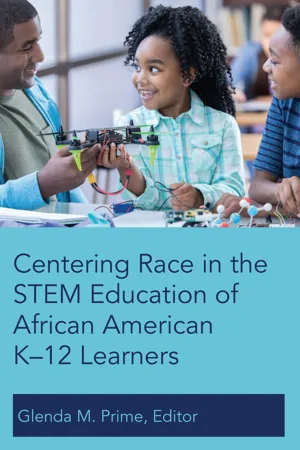
- 192 pages
- English
- PDF
- Available on iOS & Android
Centering Race in the STEM Education of African American K12 Learners
About This Book
Centering Race in the STEM Education of African American K–12 Learners boldly advocates for a transformative approach to the teaching of STEM to African American K–12 learners. The achievement patterns of African American learners, so often described as an "achievement gap" between them and their White peers, is in fact the historical legacy of slavery and the racial hierarchy that was necessary to maintain it. The achievement gap is a contemporary manifestation of the racial hierarchy that continues in STEM to the present time. The racial hierarchy in STEM education is upheld by structural arrangements, policies, and practices, sometimes invisible, but ultimately denies access and depresses performance of African American K–12 learners in STEM. This book argues that disrupting these patterns of achievement and realizing more equitable outcomes for this demographic is essentially a political act that requires that race be overtly addressed and centered in the STEM education of these children—an approach called "race-visible pedagogy." While this approach incorporates some of the elements of culturally responsive pedagogy and other anti-racist or liberatory pedagogies, it advances the thinking about such approaches by shifting the emphasis from the outcomes of such pedagogies to the experience of them. This book covers a range of issues related to the STEM education of African American K–12 learners and includes theoretical pieces that offer insightful, new, and asset-based, as opposed to deficit-based, frameworks for understanding and disrupting the patterns of achievement of African American children, as well examples of the practice of race-visible pedagogies.
Frequently asked questions
Information
Table of contents
- Cover
- Table of Contents
- List of Figures
- Acknowledgments
- Introduction: Race-Visible Pedagogy in the STEM Education of African American Learners (Glenda Prime)
- Challenging Whiteness in Science Education (Gale Seiler)
- Toward a Transformative Framework for STEM Education: Achieving Equity Through a Holistic Approach (Roni Ellington)
- Reconceptualizing Science Education for Learners of African Descent (Jomo W. Mutegi / Crystal H. Morton / Leslie K. Etienne)
- Broadening Millennials’ Participation in STEM and the Teaching Professions Through Culturally Relevant, Place-Based, Informal Science Internships (Jacqueline Leonard / Scott A. Chamberlin / Elsa Bailey / Geeta Verma / Helen Douglass)
- Developing Pre-Service Mathematics Teachers to Meet the Needs of Black Male Students in Teacher Education Programs (Julius Davis / Ramon B. Goings / Keisha M. Allen)
- Toward a Framework for Culturally Relevant Inquiry-Based Science Pedagogy (Vanessa Dodo Seriki)
- Antiracist Curriculum and Pedagogies in Science Teacher Education (Felicia Moore Mensah)
- Contributors